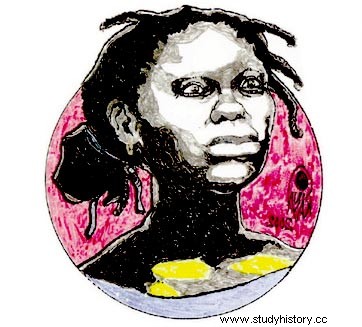Descendant of slaves, Lumina Sophie, known as "Surprise" (1848 – 1879), rose up against segregation and persistent racism in Martinique after the abolition of slavery.
A youth marked by segregation
 Lumina Sophie was born as Marie-Philomène Sophie on November 5, 1848, in Vauclin, Martinique. His mother, Marie Sophie (known as Zulma) had just been freed by the abolition decree of April 1848. The child was nicknamed Surprise. She spent her early years at the La Broue estate, within an extended family including her mother, her grandmother Reine Sophie as well as uncles and aunts. With a plot of land, the family cultivates coffee trees, cocoa trees, banana trees.
Lumina Sophie was born as Marie-Philomène Sophie on November 5, 1848, in Vauclin, Martinique. His mother, Marie Sophie (known as Zulma) had just been freed by the abolition decree of April 1848. The child was nicknamed Surprise. She spent her early years at the La Broue estate, within an extended family including her mother, her grandmother Reine Sophie as well as uncles and aunts. With a plot of land, the family cultivates coffee trees, cocoa trees, banana trees.
When Surprise is six years old, her grandmother dies and the extended family disperses. Zulma and her daughter moved into the Champfleury estate near Vauclin. They live from various activities:various crops, harvesting sugar cane and coffee, selling in the markets, sewing. Working with her mother as a seamstress and as a day laborer in neighboring estates or as a saleswoman in markets, Surprise discovers the living conditions of workers and peasants. There, she experienced the inequalities suffered by rural populations, particularly in terms of taxation and access to education. In a Martinique where the abolition of slavery is still recent, the privileged classes try to preserve their advantages, and segregation is significant. Surprise is particularly sensitive to this.
At 21, Surprise met Emile Sidney, with whom she moved into cohabitation. Coming from a family of free blacks (freed before the abolition of slavery), Emile helped to forge his critical thinking on the inequalities that persisted in Martinican society and on the fate of rural populations. Surprise is already known as an activist, and her passionate speeches and her strength of character have earned her the nickname "Lumina", in reference to her first name Philomène but also to light.
The great uprising in southern Martinique
In 1870, Léopold Lubin, a young black man, refused to let Augier de Maintenon, béké (a white Creole inhabitant descending from the first European settlers) pass. In response to his refusal, he was thrown from his horse and beaten with a riding crop. When, two months later, Léopold Lubin avenged himself by returning the favor to Augier de Maintenon, he was immediately arrested and heavily sentenced. This condemnation immediately triggers a wave of solidarity and a great insurrection. In September, Lumina Sophie is part of the crowd that gathers in the market place of Rivière-Pilote. On the 22nd of the same month, the population of southern Martinique caught fire. Although two months pregnant, Lumina took part in the insurrection.
The angry mob, including Lumina, marches towards the La Mauny dwelling. There resides Mr. Code, a member of the jury in the Lubin case, who publicly boasts of having had him convicted. The man also hoisted a white flag, symbolizing the slavery era. Code is shot seven times, and a state of emergency is declared in Martinique, in 15 municipalities. The army is mobilized and the insurrection is defeated on September 26. That day, and a few weeks later, 500 rioters were arrested and more than a dozen killed. 75 will be sentenced, including 8 to death.
Lumina is among the imprisoned rioters. During her two trials, she is presented as the flame of the revolt, the queen of the company, the most terrible of the gang leaders. She is accused of being an arsonist, of seeking to dominate men, of denying her status as a woman. In April 1871, she gave birth to a little boy who was named Théodore by the prison administration, and who was immediately taken away from her; the child will die in prison fourteen months later. In June 1871, Lumina was sentenced to hard labor for life for having burned houses and participated in the insurrection.
Lumina Sophie is deported to the penal colony of Saint-Laurent-du-Maroni, in Guyana. She died there eight years later, of illness and mistreatment, after being forcibly married to a French prisoner.
We lend him these words:
"The Good Lord would have a hut on the ground that I would burn it because God is surely only an old béké. »
